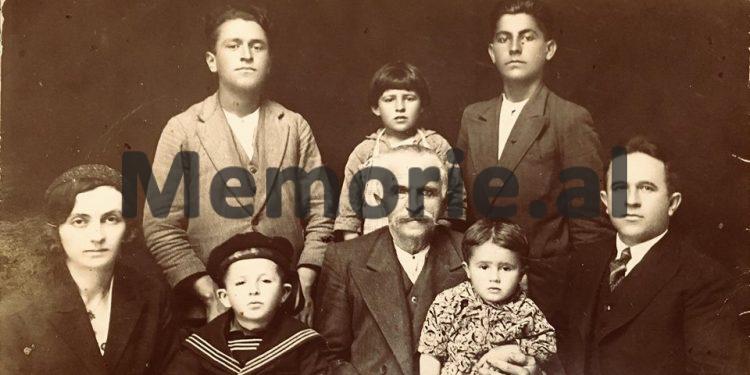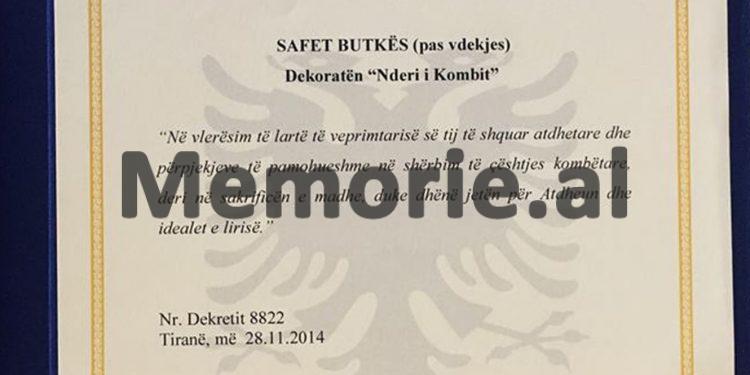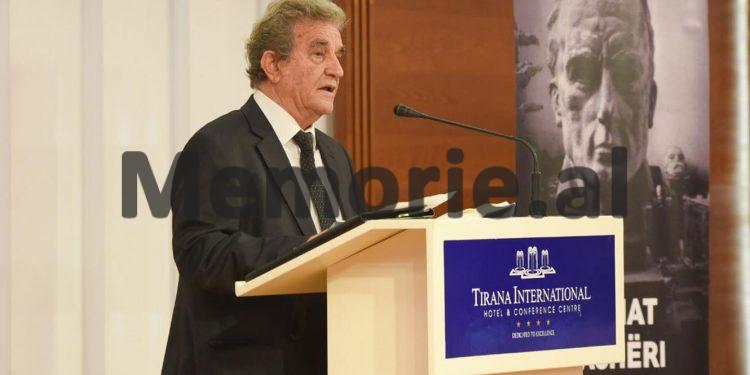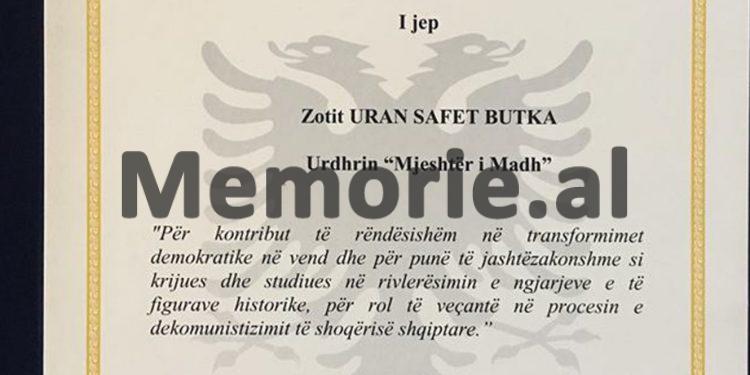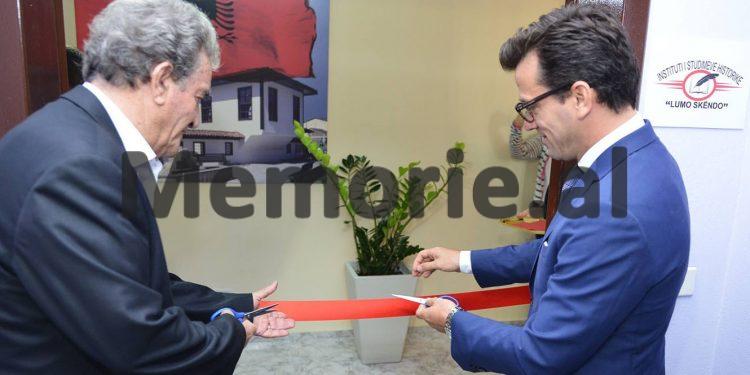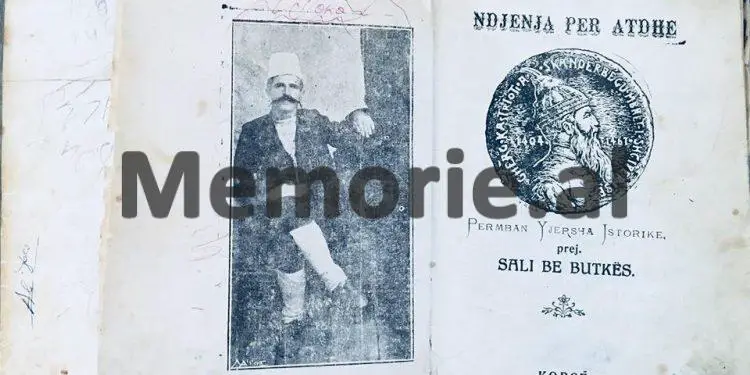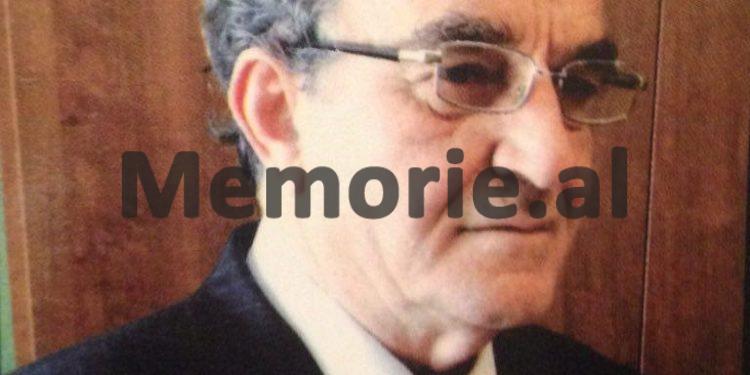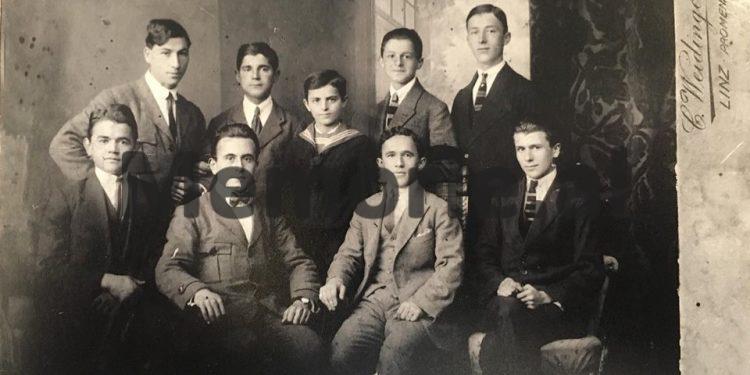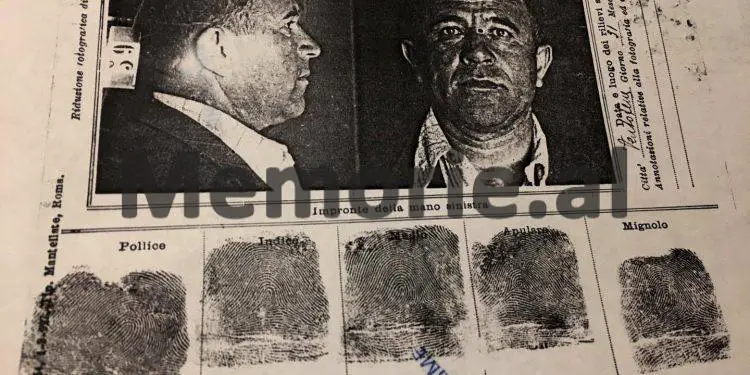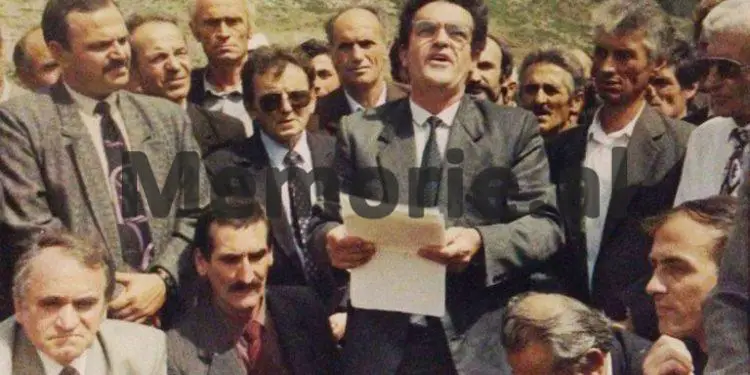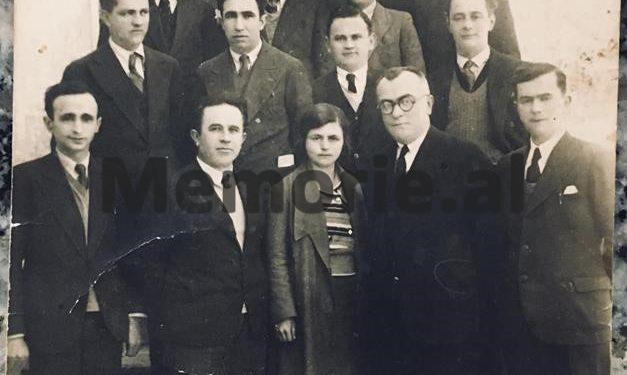Dashnor Kaloçi
The third part
Memorie.al/ publishes the unknown story of the Butka family with early origin from the village of Frashër i Dangëllisë, who later settled in Butkë and Orgockë of Kolonjë, where their first was Sali Butka, who was initially known as Sali Tahir Alicka. Rare testimonies of Uran Butka, one of the most famous suckers of this large and famous family in the history of Albania, who is known as: historian, researcher, publicist, writer, painter, politician and former MP, being a by well-known public figures of post-1990s Albania. The stories of Mr. Butka, for the patriotic activity for the benefit of the Albanian cause of his grandfather, otherwise known as the Elder of Butka, a renaissance nourished by the works of Sami, Naim, Jani Vretos, etc., who became a propagator of the Renaissance culture, books , Albanian press and schools in Kolonjë and Korçë, where together with Petro Nini Luarasi and Jani Cico Kosturi, in the years 1893-1895, they opened 5 Albanian schools in Kolonjë. How did he protect them from the Turkish government and the Greek Patriarchate, Sali Butka’s rifle, while Saliu himself, secretly brought from Bitola, Albanian books for the first Albanian schools? The unknown story of his son, Safet, from graduating in Vienna during the Zog Monarchy and then one of the main leaders of the nationalist organization Balli Kombëtar during the period of occupation (1939-1944), who sacrificed his life , to stop the fratricide between partisan and nationalist communist forces, until the Butka family was persecuted during the period of Enver Hoxha’s communist regime.
Historian, researcher, publicist, writer, painter, politician and former MP, Uran Butka, one of the most well-known public figures after the 1990s, despite holding eight decades on the shoulders of his life, continues to work again , even with tremendous energy, as if seeking to challenge not only his age, but also all that dark period of time for him, before the 1990s, when the communist regime had deprived him of the right to write, studies and books, of which he says will be his inseparable companion for the rest of his life, as long as he has a living spirit. Immersed in books in his work studio, somewhere in the center of the capital near the Lumo Skëndo Institute, which he has been running for a few years, it seems that he has not yet recovered from a job that is very precious to him, and he will we said without exaggeration one of his dreams, that of bringing home the remains of Mit’had Frashëri, his idol and at the same time the leader of Albanian nationalism. Author of many books, such as those with historical studies, but also the deliverer of literature with novels and story books, Uran Butka has almost never spoken or written about his life. This is also one of the reasons that prompted us to meet and conduct this exclusive interview for Memorie.al, but life with his personal stories can never be separated from the saga of the Butka family, who are rightly called, as: strong and precious stones in the foundations of Albanian history. So, in this context, are we starting from the roots of this family?
Continued from the previous issue
Mr. Uran, did your wife, Meremja, have problems getting in touch and marrying the son of “an enemy of the people, with a mark”?
Yes of course. At the general hospital where Merjema worked, Ana Petani, a careerist who wanted to be devoted to the party, raised the issue that Merjem had taken Safet Butka’s son and we, by order of the secretary of the Central Committee of the Party, Hysni Kapos, they removed us from Tirana to place us away from the border and the inhabited centers. Despite the great pressure, Mary refused to part with me, saying: wherever he is, I will be too.
Where were you sent after this order “from above”?
At first, they took us to old Tropoja, but it was close to the border. The First Secretary of the district party rebuked the chairman of the Committee, who had placed us near the border, when Comrade Hysni had instructed us to be placed far from the border and away from the centers, for political reasons, that I was the son of Safet Butka (see documents of the Prime Minister). We were temporarily taken to Fierza, until the Deportation-Internment Commission, headed by Manush Mufti, found the right place. But Fierza was a populated city. At the education center, they made us publicly discredited.
Specifically, what happened to you there?
They raised Mary to her feet and said, “Why did you come here?” “The government brought me to work as a doctor,” she replied. “Why does he not tell the truth?” they said. The six-month-old girl in her arms began to cry. “Shut up,” they told him. In the meantime, I got up, here I am, what do you have to do with this? I am the son of Safet Butka, who was anti-fascist and did not kill any Albanian, except himself. A school principal stood up and said: this one, dear friends, is making our ballistas patriots! Some workers (or security guards) also stood up and told us to hang a stone around their necks and throw them in the Drin. Mary was also breastfed at that moment. He was terrified. I told him to leave for Tirana with his mother, because apparently, I will be arrested…! However, an honest colonial technician, a party member, stood up and said, “What are you doing like this? This is a patriotic family, comrade Enver spoke well of Sali Butka and Gani Butka “. So, the issue was postponed a bit. Until it was resolved, we were placed in the town of Bajram Curri.
How were you treated there?
There, Merjemen called the police chief and told him to hand over the house in Tirana. She told him that they had come provisionally and that her mother lived there. The policeman told him: “You have come here forever and here you will die!”. She became very depressed and returned home haunted. On the way, a citizen asked: “Where is the cemetery? He had lost his mind. Of course, it was a psychological shock for him. Finally, the Deportation Commission in Tirana sent us to Martanesh. We were stuck at the foot of Kaptina Mountain at Baba Faja Teqe, which had been returned to the hospital. Away from the border and away from the people, as comrade Hysni had ordered!
What about jobs where you were stabilized in Martanesh?
Mary was stripped of her nephrology specialty and made a general practitioner. However, as a doctor she worked well, loved the martaneshas and brought patients from all sides. Meanwhile, there was no place for me in education either, and I was appointed accountant of the council, replacing a man with primary education. It was intended to alienate us and the whole family from citizens and professionals to cooperative villagers. This thing lasted full for 11 years in a row. When we came to Tirana to see the children, we traveled during the winter on the difficult road from Martanesh to Krasta, two hours on foot, then with chrome cars in Bulqiza, Burrel, Laç and Tirana, of course with the permission of the Internal Affairs Branch. During the summer, we went to Biza on foot, traveling 3-4 hours, then with wood trucks, to Shëngjergj and Tirana.
Given the difficult profession of doctor, did your wife, Mary, have any problems?
Mary has suffered particularly; I will even tell an event of hers. They brought to the hospital a woman, who had fallen from the oak, where she was cutting leaves for the cattle. She was eight months pregnant and was brought there unconscious. The doctor did everything she could to keep him alive and alerted Burrell about a helicopter. It was not possible to carry it with animals or on stretchers. He informed Tirana, the Ministry of Health, then the Prime Minister. It was an improvised situation “war” against imperialism, so the helicopter could not leave. The mother and child will die, the responsibility is yours, said Mary. So, after her persistence they were forced to send the helicopter, which for 10 minutes arrived at the Tirana maternity hospital. Dr. Glozheni said: “When this doctor saved him, then how can we not save him”. He underwent surgery, and returned to Martanesh after 6 months after suffering major fractures. A dinner was held at the Martanash club, the village nobility gathered. Only two people were not at that dinner: the doctor and the patient. Sometime in the middle of the orgy, when her husband raised a glass: “The health of the doctor, who saved him”!, At this moment the secretary of the bureau, Azis Kuka, attacked him and said: reactionary ” Thus began another attack on us, that is, even the attempt to do good, turned to its opposite. Maryam fell ill in difficult conditions and returned to Tirana, while I stayed there for several years, until the start of the Democratic Movements of the 1990s.
When you returned to Tirana, where did you first work?
In Tirana I worked in the municipal enterprise as a worker, then as a painter, I painted my bicycles and made their stamps with a brush, it was very difficult, but I managed to master this profession to support my family. Mary was left without a job.
You made a painting in Martanesh, “Autumn Landscape”, you called it. Have you had time and quiet to paint?
This painting has a story. One Sunday, when there was no emergency (because I accompanied the doctor to the emergency room three or four hours away in every village in Martanesh), I took the easel, melted the dry paint and told him I was going to the forest for a painting… She said to me: Exactly today? Doesn’t September 1 remind you of anything?” Not! I told. I ran away to an unexplored place. I was struck by a giant beech tree that was dying as a young shoot sprouted from its body. Life and death. I was late to realize the landscape. Mary got upset and went out with two or three people with torches, that there was a place of bears. When we returned, I saw on the table a bouquet of flowers with a note: “Happy birthday doctor!” I remembered. I took the painting and gave it to him. Mary keeps it as a beautiful memory of hard times. Meanwhile, she went to the Ministry of Health, to be interested in being reinstated in work, in a closer district. At the time he was a deputy health minister from Martanesh. He received her very well, because he had heard that she was a very good doctor and said: “I will help you, but I want that painting of the Martanesh forest, which reminds me of the” Russian Forest “(he had studied in Russia) I have it ”. It was a bribe. But Mary revolted, slammed the door, and fled. When I came back from Martanesh, I found him with puffy eyes and he said to me: “I do not give that painting, even if I know that I will be out of work all my life”.
How did you decide, so how did the fate of that painting go?
I tried to make a copy of that painting, but the colors came out dark, like my state of mind. In a nervous breakdown, I threw the distorted copy out the window. These events related to the difficult life, but also to the experience, created an extraordinary wealth for me, which I poured into my books.
Before times changed, so that the communist regime was collapsing, did you ever hope that your destinies would change?
I had no hope, but I held Mary bravely and she hoped. But the days came, the democratic movement began and I was of course part of it. In the elections of July 31, 1991, which the Democratic Party won in the big cities, and Tomor Malasi, chairman of the Tirana Pluralist Committee, appointed me deputy director of the “Ismail Qemali” school. But when I went to class, the students ran away from the classroom, encouraged by some Enver teachers and parents. “The Vikings are back! said. Gradually, working with one or two students, the interest began and then not only did they come to class with pleasure, but together we became part of the change.
At that time, you ran and were elected MP…?
Yes, I was later elected MP for Kolonjë and chairman of the Media and Culture Committee for two legislations (1992-’96 and 1996-’97). During this time, I worked in Parliament on laws in the field of culture and media, and even realized the draft for public and private television. Meanwhile, as chairman of the Figure Evaluation Commission, I have made efforts to whitewash and evaluate hundreds of figures persecuted by the communist regime in Albania and Kosovo. I have published several books and many articles in the press about them.
Let us remember that in that period, that is, in your first term as an MP, you delivered some harsh speeches from the rostrum of the parliament….?!
Yes, in the period when I was a member of the leadership of the Democratic Party and at the same time a Member of Parliament, I was critical of the communist regime of Enver Hoxha, I demanded that he be legally punished, as well as those who had committed crimes, such as Sheqfqet Peçi, Aranit Çela etc., while I have also publicly criticized Berisha for authoritarianism, mistreatment of property and political persecution. These criticisms have also been published in the daily press.
But then you left politics, why…?!
I left politics on my own and got into historical studies and literary creativity. Three years ago, we founded the Institute of Historical Studies “Lumo Skendo” in Tirana, together with Agron Shehaj, a well-known businessman, now a member of the Democratic Party in parliament. This institute, in addition to various historical researches and studies, is publishing the complete work of Mid’hat Frashëri in 23 volumes, an extraordinary wealth of Albanian and European history and culture.
In addition, did you personally become the initiator for bringing Mit’had Frashëri’s remains home?
Yes, the Lumo Skendo Institute, which I lead, took the initiative to return the remains of Mid’hat Frashëri from New York, and with the support of the government and the institutions of the Albanian state, it was possible to return his remains. and their placement in the pantheon of prominent people, next to the brothers Frashëri and Faik Konica. The bust of Mid’hat Frashëri, which was placed there, was realized by the well-known sculptor Agim Rada. I feel lucky and proud of this national investment, just like ten years ago, when as chairman of the Culture Committee in parliament I took the initiative to return the remains of Faik Konica and together with Minister Teodor Laço and poet Bardhyl Londo, we went to Boston and we brought home the remains of Konica.
You have personally made many historical and literary publications; can you tell us something about them?
During these years I have researched in Albanian and foreign archives and libraries and I have published many publicist and historical books, such as’ Revival ‘,’ Civil War in Albania 1943-1945 ‘,’ Bar Massacre ‘,’ Mukje Agreement ‘,’ Genius of the Nation ‘,’ Kristo Kirka ‘,’ Safet Butka ‘,’ Bomb in the Soviet Legation ‘,’ Shadows of History ‘,’ Albanian Elite ‘,’ First Anti-Communist Uprisings’, ‘Right and Left in War’ etc. I have published historical works out of the obligation to assist in the correction of politicized history and in the historical and documented evaluation of national events and personalities. I have also published literary works, because literature is my hobby, my freedom, it springs from my soul, and it is appreciated. There are several books with stories and novels such as ‘White Death’, ‘In our house’, ‘Only one night’, ‘Loss is not the end’, ‘Finally free’ and the novel ‘The myth of Haxhi Qamil’. I have also made over 10 documentaries on historical events and personalities, such as ‘Ventotene’, ‘Sabiha Kasimati’, ‘Musine Kokalari’, ‘Kryeziu Movement’, ‘Mallakastra as it was’, ‘Kamber Prishtina’, ‘Dibra Uprising’ 1913 ‘,’ The Movement of Malësia e Madhe and Postriba ‘, etc.
While you have been awarded many important state and international awards and orders, can you tell us some of them?
For me, the work, the help and the traces that a person leaves in his life are important./Memorie.al




